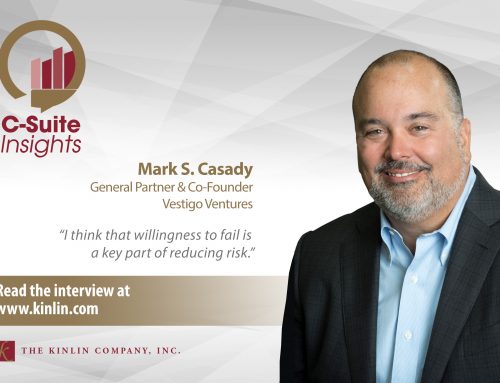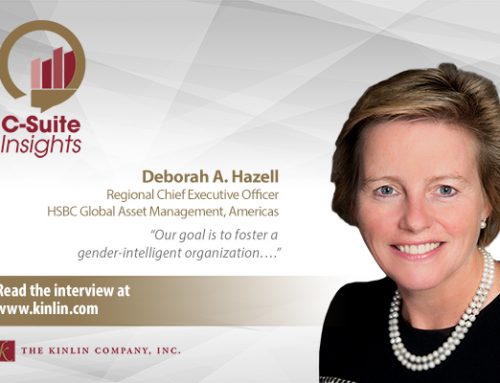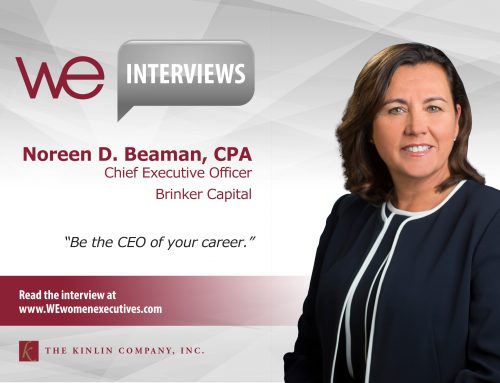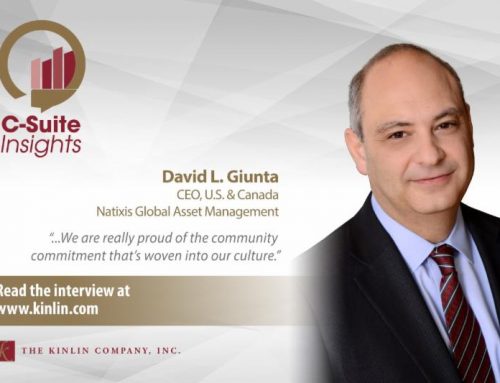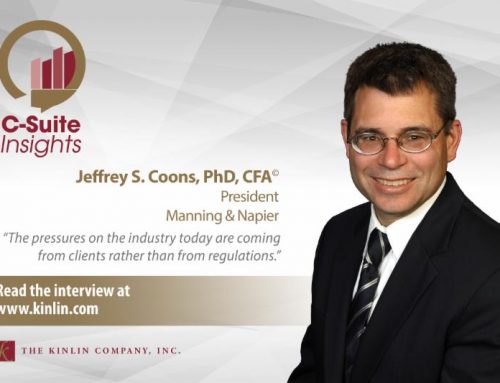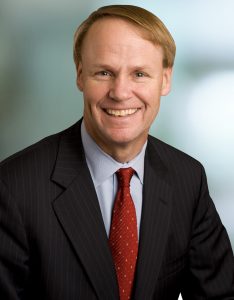 William F ‘Ted’ Truscott
William F ‘Ted’ Truscott
CEO
Columbia Threadneedle Investments
As the CEO of Columbia Threadneedle Investments, the asset management subsidiary of Ameriprise Financial, Ted Truscott is on the move constantly, and he’s fine with that. Truscott is responsible for overseeing the company’s retail, institutional and owned asset portfolios, including the Columbia and Threadneedle families of mutual funds, collective funds, separate accounts, alternative investments and ETFs. He is also a member of the Ameriprise Executive Leadership Team.
Columbia Threadneedle’s assets under management total approximately $454 billion and its workforce numbers some 2,200 people worldwide, including approximately 560 in Boston, over 600 in London, and nearly 700 in Minneapolis. Other employees operate from a variety of offices in key markets around the world. It’s not surprising, therefore, that Truscott frequently finds himself traveling to Europe, the Middle East and Asia, all of which he finds invigorating.
In the fall, I sat down for a conversation with Truscott in which he talked about the changing face of asset management and the need for new skillsets.
A sea change in asset management
Given Truscott’s depth of experience in asset management, I was eager to get his read on the sector, so I immediately cut to the chase. What are the trends and developments that you’re seeing, and what are the pressure points that keep you up at night, I queried.
“I think that more than any time in the last 20+ years, we’re witnessing a sea change in asset management, and it starts with the pricing pressure that’s out there. You’re seeing it in both the retail and institutional marketplaces.
“So where is it coming from?’ Well, number one, part of it’s the environment. We’ve had near zero percent interest rates and very low returns, so people are looking at fees, which makes sense. Then you’ve got the pressure from passive products. The third piece is the evolving regulatory environment, here in the U.S and in Europe.
“In conjunction with that, asset management is being unbundled, just like the cable industry, and what I mean by that is people will pay a certain price for beta, smart beta, factor-based beta – which used to be called Alpha – and then for Alpha, assuming you can achieve it, i.e., true excess return. Investors are increasingly making it clear that they want greater choice and are prepared to pay differently for that flexibility.
“The risk for clients, of course, is the notion that cheaper means better. Passive does serve a purpose in our industry – it always has, and it always will. But it’s not a ‘be all and end all’ to investors’ needs. Add in the changing nature of distribution, the growing importance of technology, as well as the increased globalization of this business, and you have an industry that is evolving in big ways.
At some point, passive could get to a point where the inefficiencies that used to be much more prevalent in this market will reappear because passive, by nature, is just looking in the rear view mirror. There’s nothing wrong with it. It just, by definition, looks backward. If you’re an optimist about this industry, you say the reason that it’s harder to beat the index these days is because there are so many people spending so many hours every day discerning the fair price for a given security that there’s not much upside left to be found.
“Technology is going to play a much bigger role, and we’re looking hard at how it’s changing the industry. In fact, I think the role of the traditional analyst is evolving as technology becomes an increasingly important tool in their toolkit. So technology can do more of the basic data gathering for you and you’re going to spend more time doing analysis.
“I think about whether a successful manager of the past would be successful today? There were certain dynamics that don’t exist anymore, including changes brought on by Regulation FD. There were not as many portfolio managers or analysts then, so if you had an exceptional investor he was going to get famous because he was so good. Well, there are a lot of exceptional investors in Boston today that aren’t well known, partly because there are more of them. It’s harder now.
“But look, there are other industries that are going be growing faster than asset management. It’s still a great business, and it’s still going to grow because demographics are going to make it grow, but there are changes underway.
“In fact these types of changes have already hit the investment banks and the commercial banks. The cream of the crop in this industry – the top portfolio managers and analysts – you’re always going to pay them well, you have to, but those who aren’t demonstrating value are not going to get paid the way they once did. The industry’s going to change in that respect.”
A demand for new skillsets
Truscott’s mention of top performers immediately raised a question in my mind. When you’re looking for a top-notch executive today, whether it be on the distribution side or on the investment management side, has your thinking changed at all in terms of what you’re looking for or how you go about doing it, and if so, how?
“These days, when we’re looking for top-notch individuals on the distribution side, their skillset has to be more oriented towards platform distribution because going forward the US is going to look more like Europe in terms of more platform-based distribution. Wholesaling will be different. We firmly believe it will have to be more consultative, more solution-oriented, and more value-added than it’s ever been, so that skillset is going to have to change.
“We have also been talking actively about the fact that, as we hire people – probably more in the investment area – we need more computer science skills. I would argue that asset management is late to the party on that one, compared to the investment banks and the commercial banks – there’s just more technology that can be utilized.”
Do you think that there will be a merging of technology companies with asset management firms, I asked?
“It could happen. Right now when you look at the landscape, a lot of the financial services technology is robo-advice or payments, and payments is an area that should be disrupted by technology. We have one of the most inefficient payment systems on the planet. Why do our kids use Venmo? Because they can just split a check and send five bucks to a buddy and they don’t want to carry cash.
“The other side of it is that then you go to robo-advice or algorithmic stuff like big financial engines. And there’s this thing about finance that lends itself to bricks and clicks – I don’t think that people trust their money to a black box. Now maybe our children will, but there’s just something about handing someone your money to manage. There’s a trust element that suggests to me that human interaction is still an important part of money management, which you can argue is the reason that it has taken a while for there to be as much as pricing pressure as there is in the industry now.
“And the final piece is international – you’ve got to have people who can handle dealing with multiple cultures. I’m a firm globalist; I believe that every asset manager should be a global asset manager. The reality is that if you’re going to be a big player these days, you have to play globally. You can’t just play in the United States. So we need managers that are as comfortable in the United Kingdom or Japan as they are in the United States or vice versa.”
An evaluation of policies
Truscott’s talk of the changing face of asset management and the need for new skillsets to work within that space offered a wonderful segue into my next question. You were recently named chair of the Investment Company Institute (ICI) and I’m curious: What do you view as the most pressing issues demanding your attention?
“Well, to say that the new administration has turned things on their head is probably an understatement. I think it’s fair to say that many people thought that Secretary Clinton was going to win and we were going to see a continuation of President Obama’s agenda. Clearly, there will be a number of proposals coming out of Congress or the White House that are important to the industry, including helping people save for retirement, and how the industry responds to them is going to be really important. So I think that the landscape is going to be interesting over the next couple of years, and ICI’s role is to engage in the policy debate around all things asset management.
“Quite frankly, I’m flattered and honored that they asked me to be the chair of the board. It’s really interesting work, and where else in the world can you sit in a room with fifty of your biggest competitors? As Ed Bernard at T. Rowe Price said, ‘The really wonderful thing about the ICI is that you get everybody in a room together, and there’s a common sense of purpose that’s unified around serving clients well.’ Everybody in that room wants to serve their clients well, so that creates a unity in the room that’s actually very interesting, as we all compete outside that room.
“The group is comprised mostly of CEOs or heads of distribution. You get a few CIOs, but it’s mostly CEOs or very senior people, and the people are great. They’re smart, they’re interesting, and there’s a shared purpose, which is good for the world. It’s good for clients. We want to treat clients well. We want them to succeed, and people really bring that to the table.”
A commitment to diversity
Having talked about those aspects of asset management that are experiencing major change, I couldn’t resist countering with a question on an issue in the sector that seems to change very slowly, namely gender balance. What is Columbia Threadneedle doing to ensure that more women reach their goals, I queried.
“I think it’s an important issue and we need to continue to pay attention to it. Quite frankly, it’s not just gender, it is diversity broadly defined.
“If you look at our mutual fund boards, the Columbia Funds Board is 50 percent women and the Columbia Atlantic Board is close to it. Women make up a third of our Luxembourg Board. We recently announced the appointment of Michelle Scrimgeour as our new CEO of EMEA. She will also join the Ameriprise Executive Leadership Team. So our commitment to diversity is substantial. It’s intentional, but we can always do better, on gender and diversity in general. It’s not just about building a pipeline, it’s about being deliberate, and it’s also about creating a friendly environment for all.
“My statement to our people is: ‘Diversity needs to be intentional—it’s not a matter of luck.’ We take this very seriously. It’s a big subject here and even bigger in the UK. We govern regionally – we have Business Management Committees and Risk Committees in each region – so that’s the US, EMEA, and Asia. These regional committees meet regularly and then we have a Global Heads Group where we get together and run the place globally.
“I’ve been doing international for a long time. I don’t care where people are from, it’s just about good people – that’s all that matters. So we’re working on that, and we’re working on diversity intentionally. We sponsor The Posse Foundation, which I see as a big potential pipeline for diverse candidates. We are part of The Diversity Project, an industry initiative in the UK. We’re also involved in Cristo Rey Network, which was started in Minnesota. That’s more on the Ameriprise side, but that’s a pipeline for diversity as well, and I think that at the end of the day, these programs help. You’ve got to have the pipeline of people to come in the door.
“And by the way, we’re always working to attract and retain great people and workplace issues evolve, and one of those is working from home and managing work-life balance. Many people like to, or sometimes need to, work from home. And in this day and age, they can. But we have an office for a reason, and that reason is because people getting together is actually beneficial in this business. There’s a reason asset management has people sitting together. We have an open floor plan in the United Kingdom, we don’t have offices, and I like it. If I could start over here at 225 Franklin, I’d go to an open floor plan. Our email volumes are down 30 percent in the UK just because people aren’t sending emails to each other anymore; they’re going over to talk.”
![]()

